SCI3700: Analyzing Environmental Impacts of Electric Car Transition
VerifiedAdded on 2023/05/28
|6
|1488
|316
Essay
AI Summary
This essay explores the environmental impact of transitioning from traditional fuel engine cars to electric cars. It discusses the carbon emissions from fuel engines and the potential of electric cars to reduce greenhouse gases, especially when powered by renewable energy sources. The analysis considers the efficiency of both engine types, the current reliance on fossil fuels for electricity generation, and the future prospects of renewable energy. Ultimately, the essay argues that electric vehicles, particularly with the increasing use of renewable energy, offer a promising path toward a more sustainable transportation system and a better future for the next generation. Desklib provides access to similar essays and study resources for students.
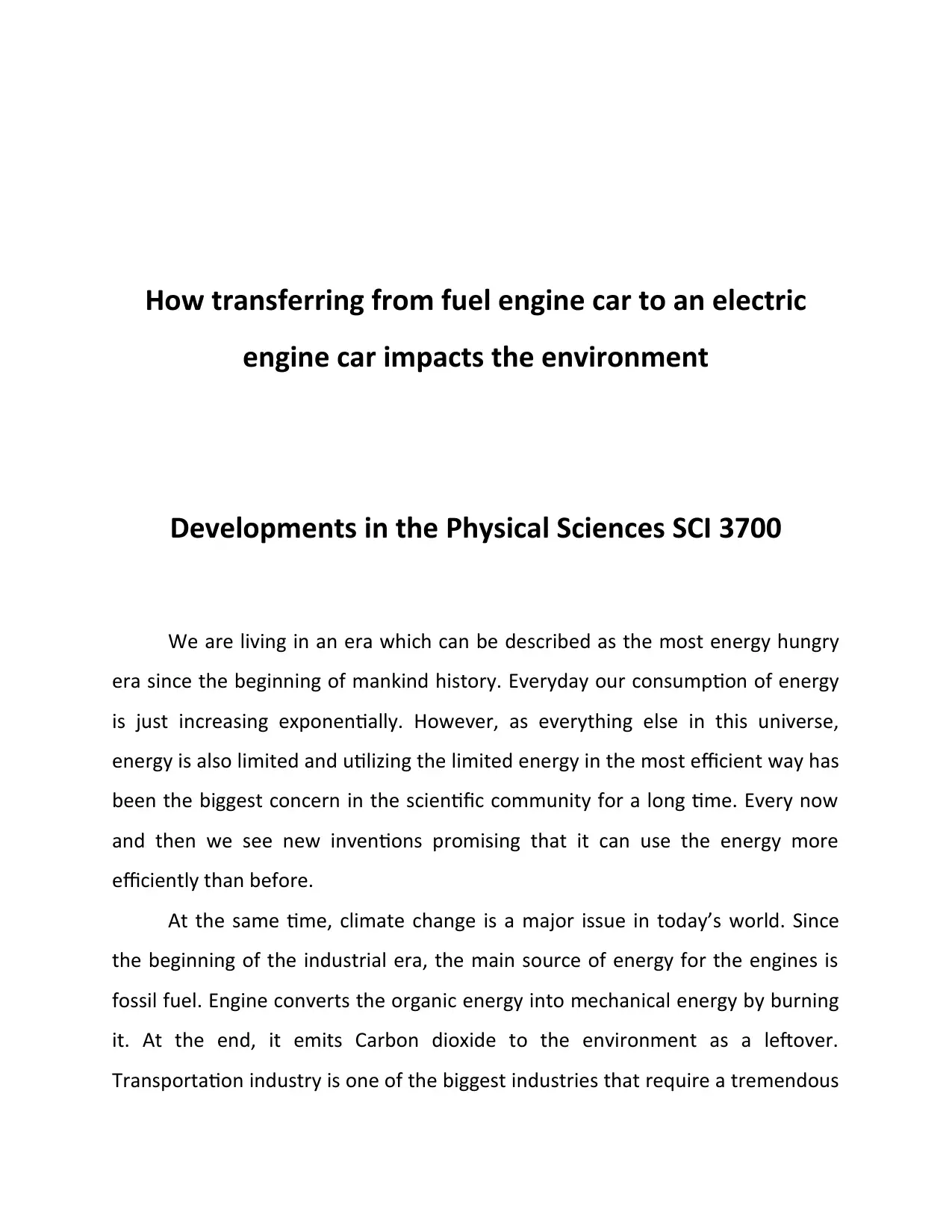
How transferring from fuel engine car to an electric
engine car impacts the environment
Developments in the Physical Sciences SCI 3700
We are living in an era which can be described as the most energy hungry
era since the beginning of mankind history. Everyday our consumption of energy
is just increasing exponentially. However, as everything else in this universe,
energy is also limited and utilizing the limited energy in the most efficient way has
been the biggest concern in the scientific community for a long time. Every now
and then we see new inventions promising that it can use the energy more
efficiently than before.
At the same time, climate change is a major issue in today’s world. Since
the beginning of the industrial era, the main source of energy for the engines is
fossil fuel. Engine converts the organic energy into mechanical energy by burning
it. At the end, it emits Carbon dioxide to the environment as a leftover.
Transportation industry is one of the biggest industries that require a tremendous
engine car impacts the environment
Developments in the Physical Sciences SCI 3700
We are living in an era which can be described as the most energy hungry
era since the beginning of mankind history. Everyday our consumption of energy
is just increasing exponentially. However, as everything else in this universe,
energy is also limited and utilizing the limited energy in the most efficient way has
been the biggest concern in the scientific community for a long time. Every now
and then we see new inventions promising that it can use the energy more
efficiently than before.
At the same time, climate change is a major issue in today’s world. Since
the beginning of the industrial era, the main source of energy for the engines is
fossil fuel. Engine converts the organic energy into mechanical energy by burning
it. At the end, it emits Carbon dioxide to the environment as a leftover.
Transportation industry is one of the biggest industries that require a tremendous
Paraphrase This Document
Need a fresh take? Get an instant paraphrase of this document with our AI Paraphraser
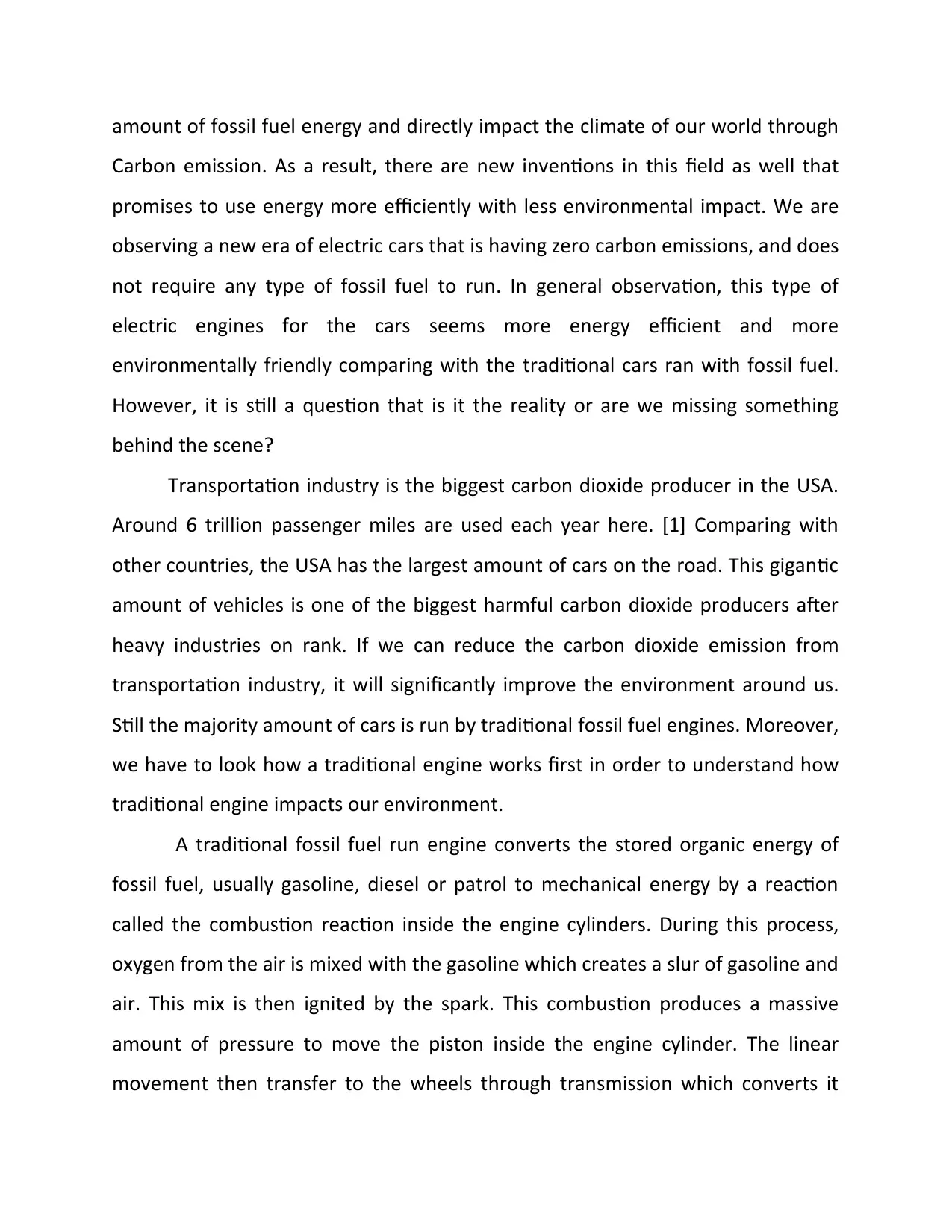
amount of fossil fuel energy and directly impact the climate of our world through
Carbon emission. As a result, there are new inventions in this field as well that
promises to use energy more efficiently with less environmental impact. We are
observing a new era of electric cars that is having zero carbon emissions, and does
not require any type of fossil fuel to run. In general observation, this type of
electric engines for the cars seems more energy efficient and more
environmentally friendly comparing with the traditional cars ran with fossil fuel.
However, it is still a question that is it the reality or are we missing something
behind the scene?
Transportation industry is the biggest carbon dioxide producer in the USA.
Around 6 trillion passenger miles are used each year here. [1] Comparing with
other countries, the USA has the largest amount of cars on the road. This gigantic
amount of vehicles is one of the biggest harmful carbon dioxide producers after
heavy industries on rank. If we can reduce the carbon dioxide emission from
transportation industry, it will significantly improve the environment around us.
Still the majority amount of cars is run by traditional fossil fuel engines. Moreover,
we have to look how a traditional engine works first in order to understand how
traditional engine impacts our environment.
A traditional fossil fuel run engine converts the stored organic energy of
fossil fuel, usually gasoline, diesel or patrol to mechanical energy by a reaction
called the combustion reaction inside the engine cylinders. During this process,
oxygen from the air is mixed with the gasoline which creates a slur of gasoline and
air. This mix is then ignited by the spark. This combustion produces a massive
amount of pressure to move the piston inside the engine cylinder. The linear
movement then transfer to the wheels through transmission which converts it
Carbon emission. As a result, there are new inventions in this field as well that
promises to use energy more efficiently with less environmental impact. We are
observing a new era of electric cars that is having zero carbon emissions, and does
not require any type of fossil fuel to run. In general observation, this type of
electric engines for the cars seems more energy efficient and more
environmentally friendly comparing with the traditional cars ran with fossil fuel.
However, it is still a question that is it the reality or are we missing something
behind the scene?
Transportation industry is the biggest carbon dioxide producer in the USA.
Around 6 trillion passenger miles are used each year here. [1] Comparing with
other countries, the USA has the largest amount of cars on the road. This gigantic
amount of vehicles is one of the biggest harmful carbon dioxide producers after
heavy industries on rank. If we can reduce the carbon dioxide emission from
transportation industry, it will significantly improve the environment around us.
Still the majority amount of cars is run by traditional fossil fuel engines. Moreover,
we have to look how a traditional engine works first in order to understand how
traditional engine impacts our environment.
A traditional fossil fuel run engine converts the stored organic energy of
fossil fuel, usually gasoline, diesel or patrol to mechanical energy by a reaction
called the combustion reaction inside the engine cylinders. During this process,
oxygen from the air is mixed with the gasoline which creates a slur of gasoline and
air. This mix is then ignited by the spark. This combustion produces a massive
amount of pressure to move the piston inside the engine cylinder. The linear
movement then transfer to the wheels through transmission which converts it
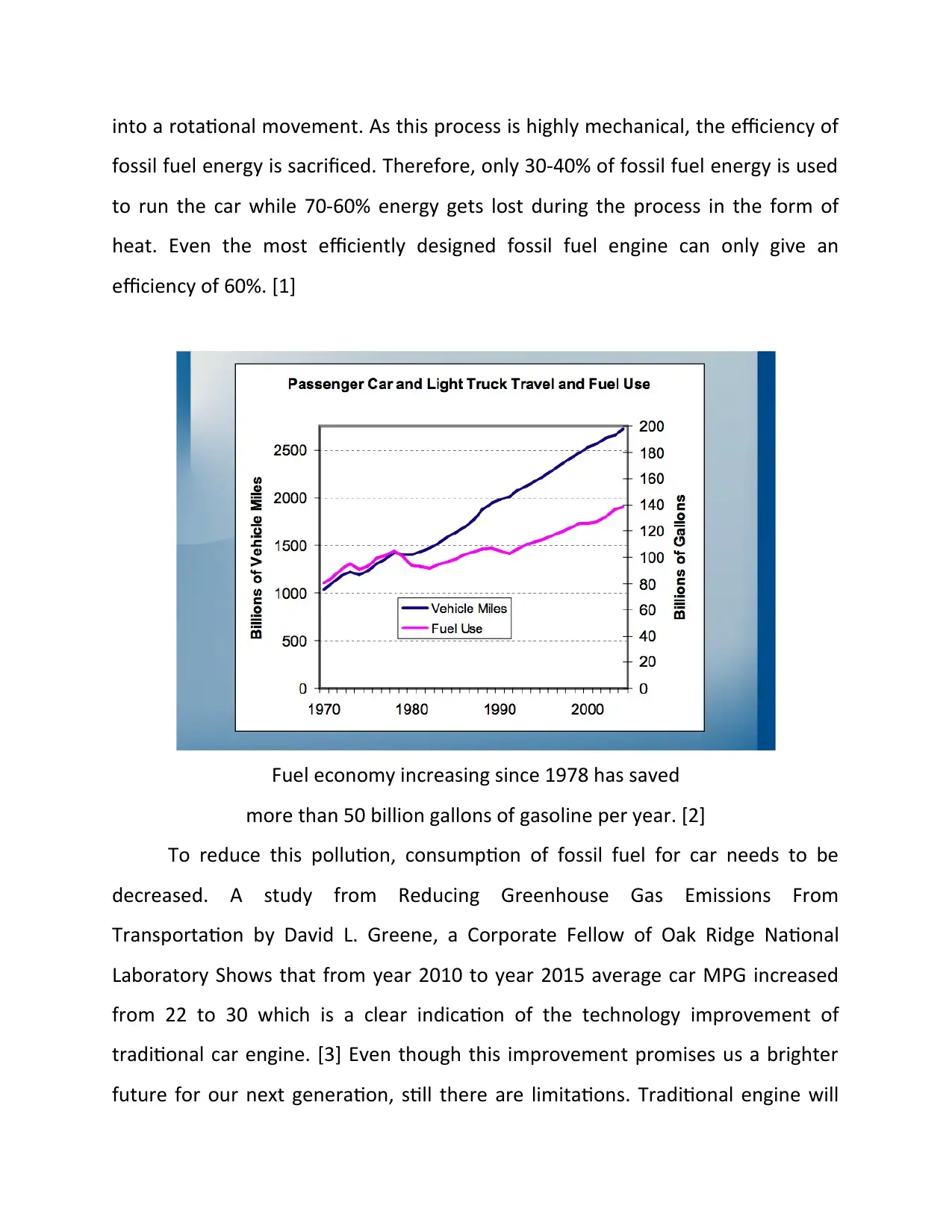
into a rotational movement. As this process is highly mechanical, the efficiency of
fossil fuel energy is sacrificed. Therefore, only 30-40% of fossil fuel energy is used
to run the car while 70-60% energy gets lost during the process in the form of
heat. Even the most efficiently designed fossil fuel engine can only give an
efficiency of 60%. [1]
Fuel economy increasing since 1978 has saved
more than 50 billion gallons of gasoline per year. [2]
To reduce this pollution, consumption of fossil fuel for car needs to be
decreased. A study from Reducing Greenhouse Gas Emissions From
Transportation by David L. Greene, a Corporate Fellow of Oak Ridge National
Laboratory Shows that from year 2010 to year 2015 average car MPG increased
from 22 to 30 which is a clear indication of the technology improvement of
traditional car engine. [3] Even though this improvement promises us a brighter
future for our next generation, still there are limitations. Traditional engine will
fossil fuel energy is sacrificed. Therefore, only 30-40% of fossil fuel energy is used
to run the car while 70-60% energy gets lost during the process in the form of
heat. Even the most efficiently designed fossil fuel engine can only give an
efficiency of 60%. [1]
Fuel economy increasing since 1978 has saved
more than 50 billion gallons of gasoline per year. [2]
To reduce this pollution, consumption of fossil fuel for car needs to be
decreased. A study from Reducing Greenhouse Gas Emissions From
Transportation by David L. Greene, a Corporate Fellow of Oak Ridge National
Laboratory Shows that from year 2010 to year 2015 average car MPG increased
from 22 to 30 which is a clear indication of the technology improvement of
traditional car engine. [3] Even though this improvement promises us a brighter
future for our next generation, still there are limitations. Traditional engine will
⊘ This is a preview!⊘
Do you want full access?
Subscribe today to unlock all pages.

Trusted by 1+ million students worldwide
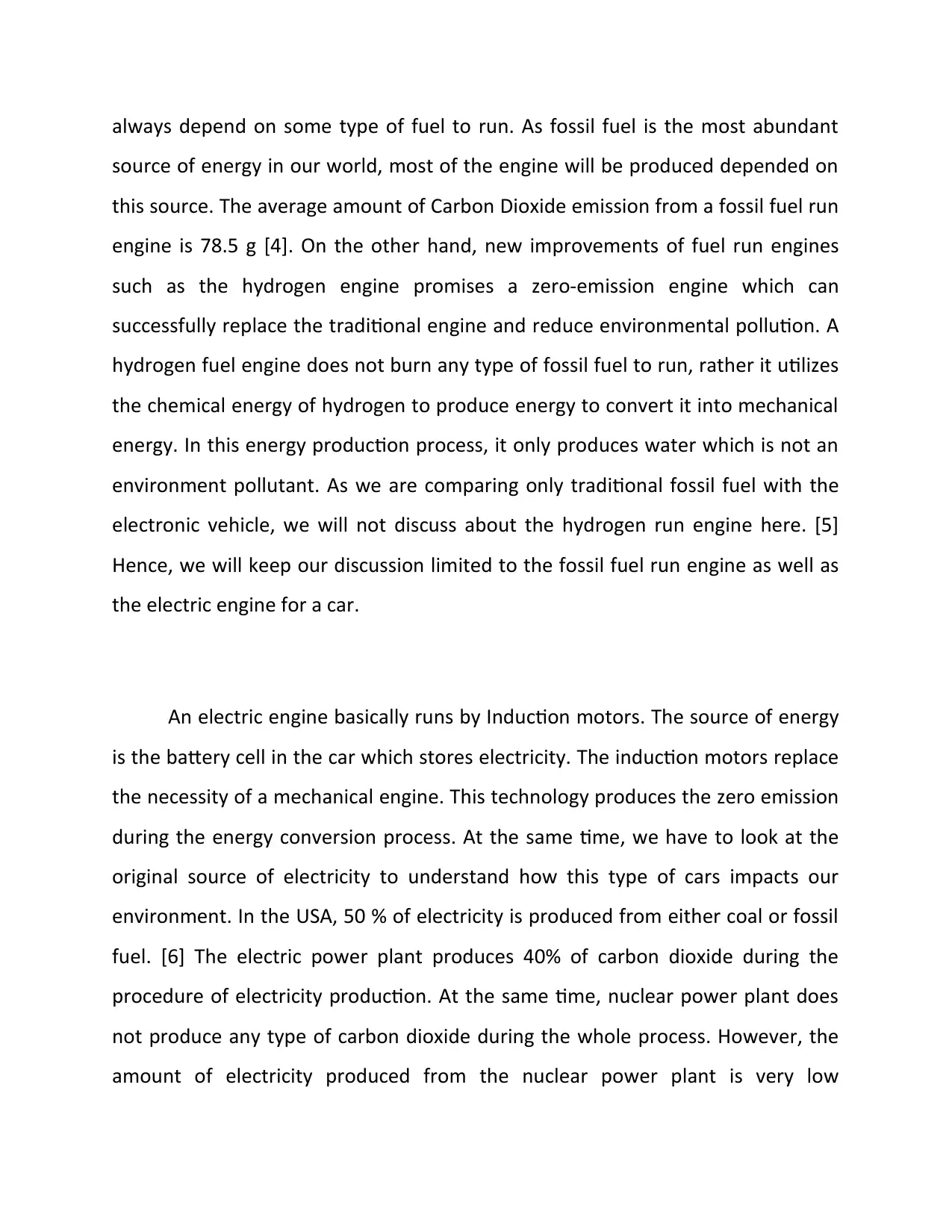
always depend on some type of fuel to run. As fossil fuel is the most abundant
source of energy in our world, most of the engine will be produced depended on
this source. The average amount of Carbon Dioxide emission from a fossil fuel run
engine is 78.5 g [4]. On the other hand, new improvements of fuel run engines
such as the hydrogen engine promises a zero-emission engine which can
successfully replace the traditional engine and reduce environmental pollution. A
hydrogen fuel engine does not burn any type of fossil fuel to run, rather it utilizes
the chemical energy of hydrogen to produce energy to convert it into mechanical
energy. In this energy production process, it only produces water which is not an
environment pollutant. As we are comparing only traditional fossil fuel with the
electronic vehicle, we will not discuss about the hydrogen run engine here. [5]
Hence, we will keep our discussion limited to the fossil fuel run engine as well as
the electric engine for a car.
An electric engine basically runs by Induction motors. The source of energy
is the battery cell in the car which stores electricity. The induction motors replace
the necessity of a mechanical engine. This technology produces the zero emission
during the energy conversion process. At the same time, we have to look at the
original source of electricity to understand how this type of cars impacts our
environment. In the USA, 50 % of electricity is produced from either coal or fossil
fuel. [6] The electric power plant produces 40% of carbon dioxide during the
procedure of electricity production. At the same time, nuclear power plant does
not produce any type of carbon dioxide during the whole process. However, the
amount of electricity produced from the nuclear power plant is very low
source of energy in our world, most of the engine will be produced depended on
this source. The average amount of Carbon Dioxide emission from a fossil fuel run
engine is 78.5 g [4]. On the other hand, new improvements of fuel run engines
such as the hydrogen engine promises a zero-emission engine which can
successfully replace the traditional engine and reduce environmental pollution. A
hydrogen fuel engine does not burn any type of fossil fuel to run, rather it utilizes
the chemical energy of hydrogen to produce energy to convert it into mechanical
energy. In this energy production process, it only produces water which is not an
environment pollutant. As we are comparing only traditional fossil fuel with the
electronic vehicle, we will not discuss about the hydrogen run engine here. [5]
Hence, we will keep our discussion limited to the fossil fuel run engine as well as
the electric engine for a car.
An electric engine basically runs by Induction motors. The source of energy
is the battery cell in the car which stores electricity. The induction motors replace
the necessity of a mechanical engine. This technology produces the zero emission
during the energy conversion process. At the same time, we have to look at the
original source of electricity to understand how this type of cars impacts our
environment. In the USA, 50 % of electricity is produced from either coal or fossil
fuel. [6] The electric power plant produces 40% of carbon dioxide during the
procedure of electricity production. At the same time, nuclear power plant does
not produce any type of carbon dioxide during the whole process. However, the
amount of electricity produced from the nuclear power plant is very low
Paraphrase This Document
Need a fresh take? Get an instant paraphrase of this document with our AI Paraphraser
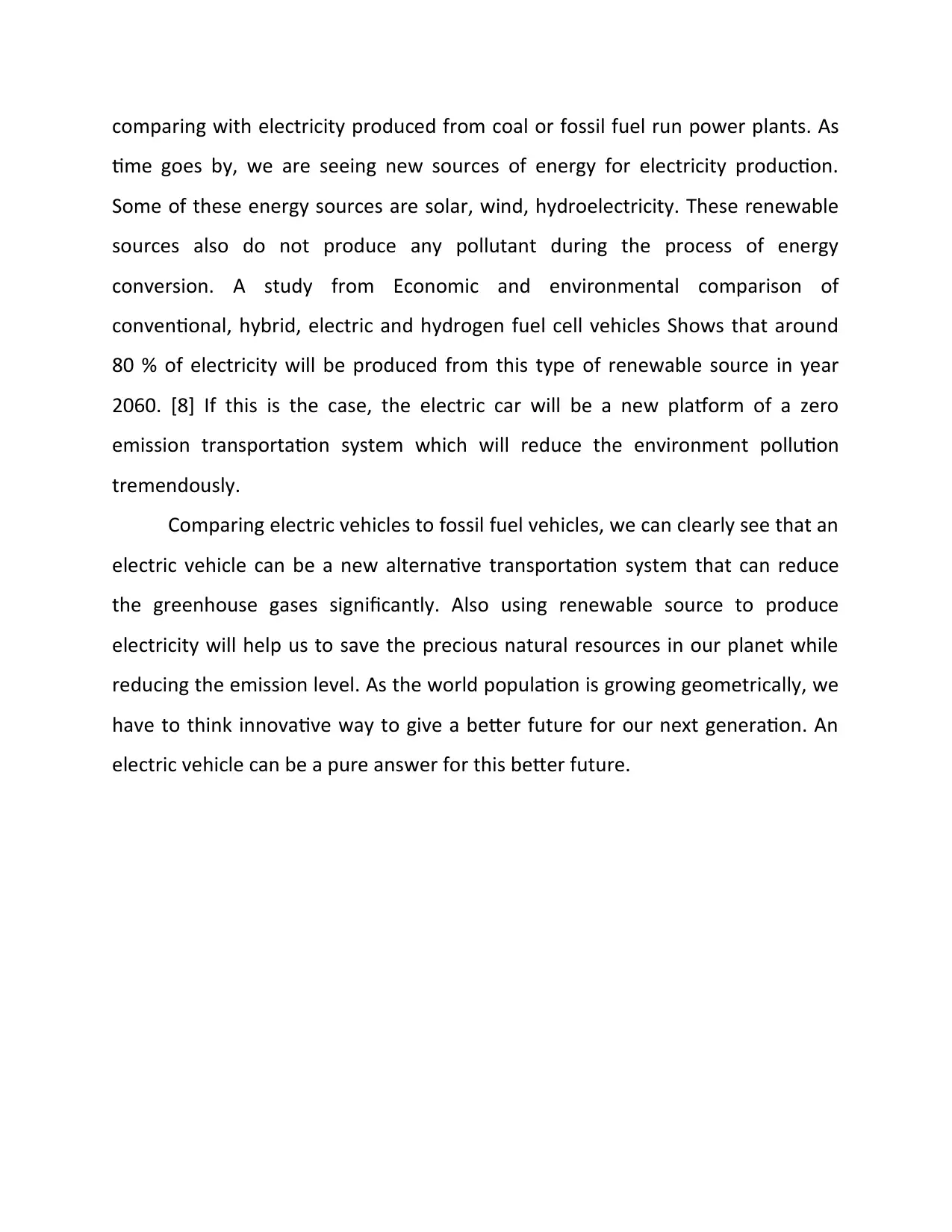
comparing with electricity produced from coal or fossil fuel run power plants. As
time goes by, we are seeing new sources of energy for electricity production.
Some of these energy sources are solar, wind, hydroelectricity. These renewable
sources also do not produce any pollutant during the process of energy
conversion. A study from Economic and environmental comparison of
conventional, hybrid, electric and hydrogen fuel cell vehicles Shows that around
80 % of electricity will be produced from this type of renewable source in year
2060. [8] If this is the case, the electric car will be a new platform of a zero
emission transportation system which will reduce the environment pollution
tremendously.
Comparing electric vehicles to fossil fuel vehicles, we can clearly see that an
electric vehicle can be a new alternative transportation system that can reduce
the greenhouse gases significantly. Also using renewable source to produce
electricity will help us to save the precious natural resources in our planet while
reducing the emission level. As the world population is growing geometrically, we
have to think innovative way to give a better future for our next generation. An
electric vehicle can be a pure answer for this better future.
time goes by, we are seeing new sources of energy for electricity production.
Some of these energy sources are solar, wind, hydroelectricity. These renewable
sources also do not produce any pollutant during the process of energy
conversion. A study from Economic and environmental comparison of
conventional, hybrid, electric and hydrogen fuel cell vehicles Shows that around
80 % of electricity will be produced from this type of renewable source in year
2060. [8] If this is the case, the electric car will be a new platform of a zero
emission transportation system which will reduce the environment pollution
tremendously.
Comparing electric vehicles to fossil fuel vehicles, we can clearly see that an
electric vehicle can be a new alternative transportation system that can reduce
the greenhouse gases significantly. Also using renewable source to produce
electricity will help us to save the precious natural resources in our planet while
reducing the emission level. As the world population is growing geometrically, we
have to think innovative way to give a better future for our next generation. An
electric vehicle can be a pure answer for this better future.
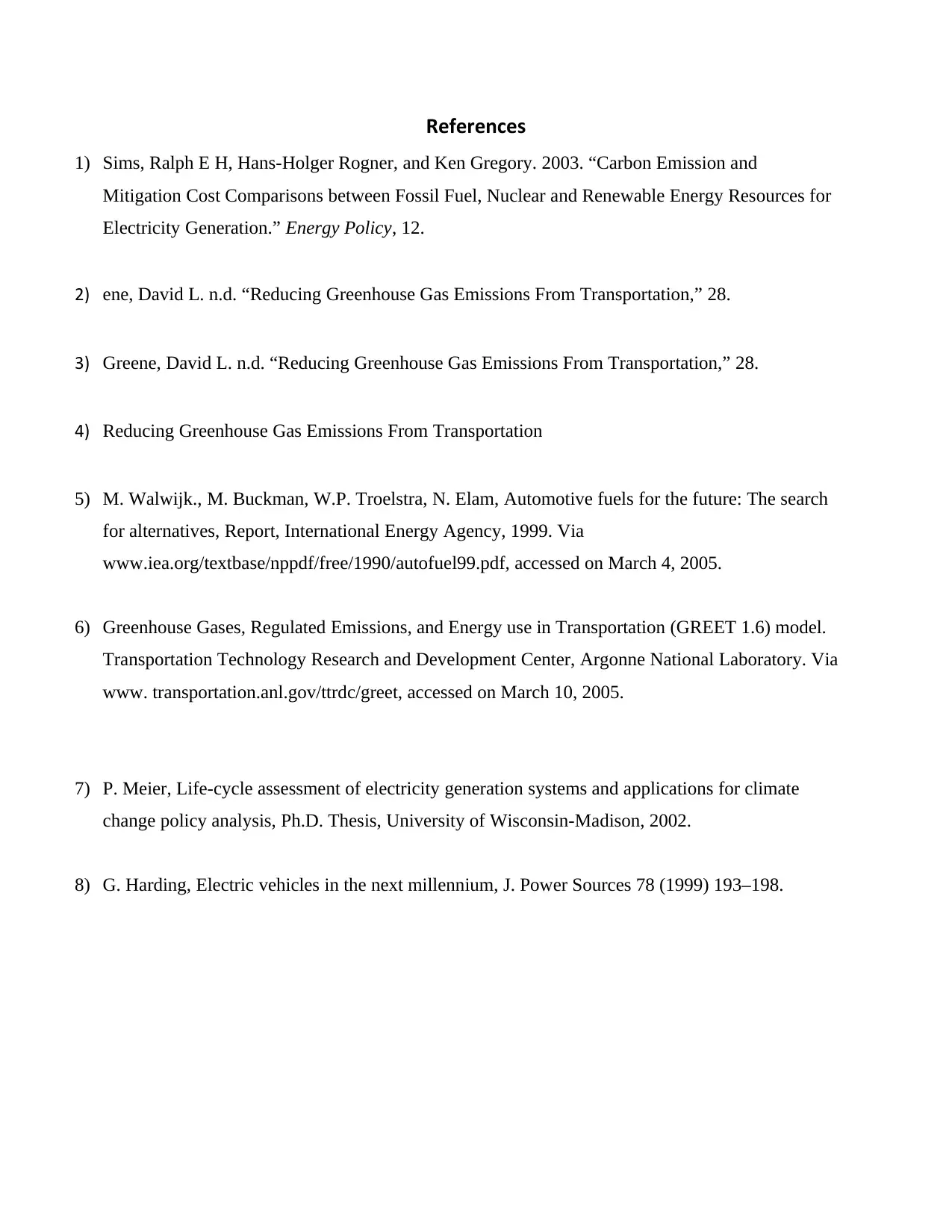
References
1) Sims, Ralph E H, Hans-Holger Rogner, and Ken Gregory. 2003. “Carbon Emission and
Mitigation Cost Comparisons between Fossil Fuel, Nuclear and Renewable Energy Resources for
Electricity Generation.” Energy Policy, 12.
2) ene, David L. n.d. “Reducing Greenhouse Gas Emissions From Transportation,” 28.
3) Greene, David L. n.d. “Reducing Greenhouse Gas Emissions From Transportation,” 28.
4) Reducing Greenhouse Gas Emissions From Transportation
5) M. Walwijk., M. Buckman, W.P. Troelstra, N. Elam, Automotive fuels for the future: The search
for alternatives, Report, International Energy Agency, 1999. Via
www.iea.org/textbase/nppdf/free/1990/autofuel99.pdf, accessed on March 4, 2005.
6) Greenhouse Gases, Regulated Emissions, and Energy use in Transportation (GREET 1.6) model.
Transportation Technology Research and Development Center, Argonne National Laboratory. Via
www. transportation.anl.gov/ttrdc/greet, accessed on March 10, 2005.
7) P. Meier, Life-cycle assessment of electricity generation systems and applications for climate
change policy analysis, Ph.D. Thesis, University of Wisconsin-Madison, 2002.
8) G. Harding, Electric vehicles in the next millennium, J. Power Sources 78 (1999) 193–198.
1) Sims, Ralph E H, Hans-Holger Rogner, and Ken Gregory. 2003. “Carbon Emission and
Mitigation Cost Comparisons between Fossil Fuel, Nuclear and Renewable Energy Resources for
Electricity Generation.” Energy Policy, 12.
2) ene, David L. n.d. “Reducing Greenhouse Gas Emissions From Transportation,” 28.
3) Greene, David L. n.d. “Reducing Greenhouse Gas Emissions From Transportation,” 28.
4) Reducing Greenhouse Gas Emissions From Transportation
5) M. Walwijk., M. Buckman, W.P. Troelstra, N. Elam, Automotive fuels for the future: The search
for alternatives, Report, International Energy Agency, 1999. Via
www.iea.org/textbase/nppdf/free/1990/autofuel99.pdf, accessed on March 4, 2005.
6) Greenhouse Gases, Regulated Emissions, and Energy use in Transportation (GREET 1.6) model.
Transportation Technology Research and Development Center, Argonne National Laboratory. Via
www. transportation.anl.gov/ttrdc/greet, accessed on March 10, 2005.
7) P. Meier, Life-cycle assessment of electricity generation systems and applications for climate
change policy analysis, Ph.D. Thesis, University of Wisconsin-Madison, 2002.
8) G. Harding, Electric vehicles in the next millennium, J. Power Sources 78 (1999) 193–198.
⊘ This is a preview!⊘
Do you want full access?
Subscribe today to unlock all pages.

Trusted by 1+ million students worldwide
1 out of 6
Related Documents
Your All-in-One AI-Powered Toolkit for Academic Success.
+13062052269
info@desklib.com
Available 24*7 on WhatsApp / Email
![[object Object]](/_next/static/media/star-bottom.7253800d.svg)
Unlock your academic potential
Copyright © 2020–2026 A2Z Services. All Rights Reserved. Developed and managed by ZUCOL.





